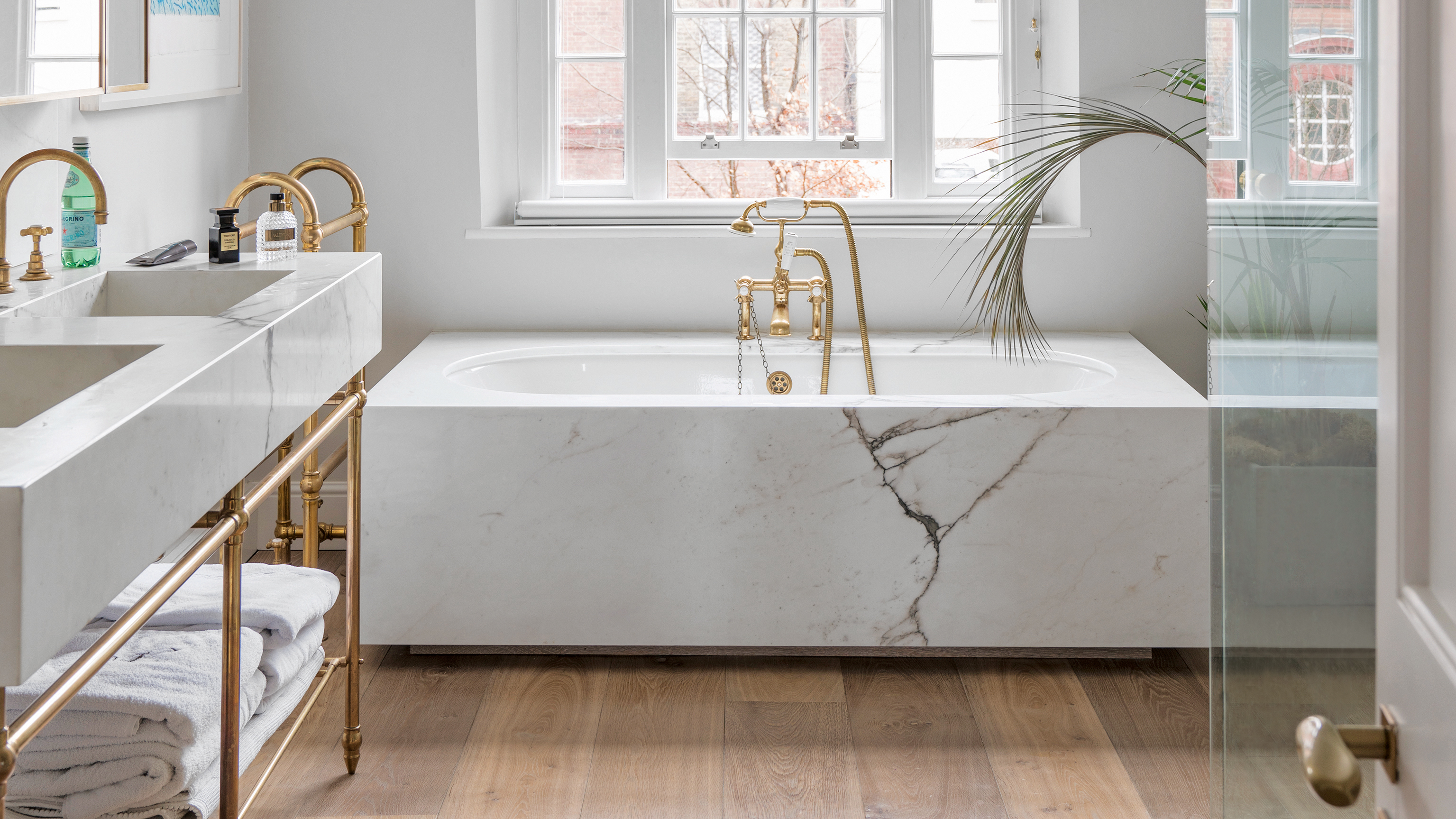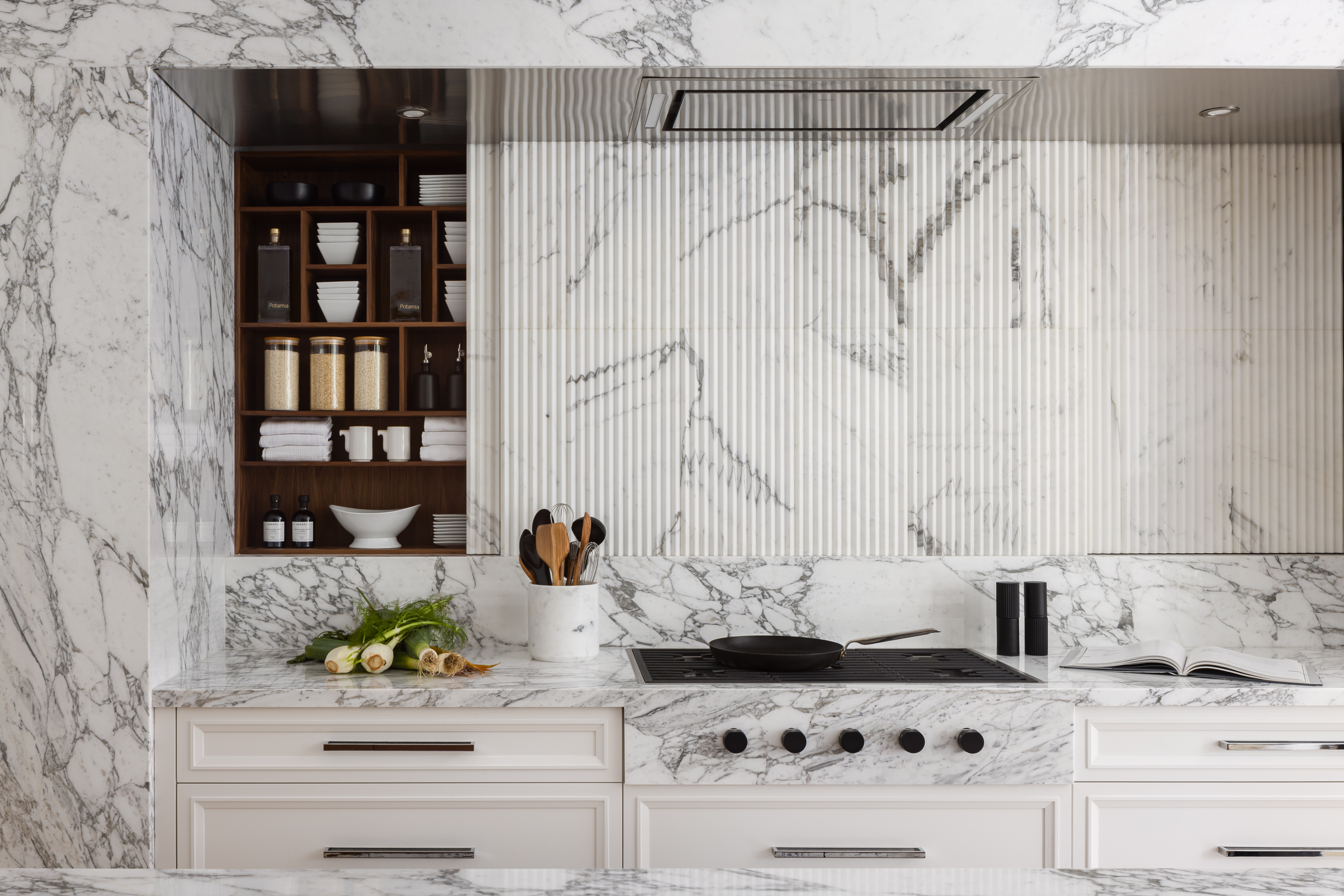
For timeless appeal, there's nothing quite like marble. Whether it's a bathroom vanity topped with the material or a deep-veined kitchen countertop, nothing quite compares to this stone's classic beauty - especially in its natural form.
Besides aesthetics, there's a lot more to love, too. Natural marble is durable, heat resistant, and offers a unique patina compared to engineered stones that mimic the material. However, as any owner will tell you, it's not exempt from stains, no matter the type of marble you have. In fact, it actually stains more easily than engineered alternatives.
"Marble stains easily because it is a porous material, meaning it has tiny holes that can quickly absorb liquids and substances," explains professional cleaner Marla Mock, President of Molly Maid (a Neighborly company). "Common culprits like wine, coffee, or citrus can seep into the stone and once these substances penetrate the marble, they can be hard to remove."
If you have an unsightly stain you need to remove from your marble, we've asked cleaning experts for their best methods which result in spotless stone every time.
What You'll Need

There are several ways to remove stains from marble. Similar to removing stains from upholstery, you might need some stronger cleaning solutions depending on the severity of the stain. That said, harsh chemicals and abrasives should always be avoided on marble. If you want an easy, inexpensive way to achieve spotless stone, here's what you'll need.
Tools and products:
• For lighter stains, you'll need some Dawn Ultra Dishwashing Liquid Dish Soap, from Amazon
• For heavier stains, a specialized marble cleaner is recommended (Try STONETECH® Revitalizer Countertop Cleaner Protector, available at Walmart)
• Multi-Surface Microfiber Cleaning Cloths from Target for polishing.
Other options:
• Baking soda, to make a paste (try Arm & Hammer, also available at Walmart)
• A Cleaning Brush Soft Bristle Brush like this one from Amazon
For Light Stains

Some stains are easier to remove than others. If the staining ingredient or item has only recently had contact with your marble, here's what to do:
Use a mild cleaning solution, like dish soap
"If the stains are light, you can make a mild solution using warm water and a little bit of Dawn Ultra Dishwashing Liquid," suggests Rhonda Wilson, Quality Lead Cleaner at FreshSpace Cleaning. "Just apply the solution with a soft cloth or sponge, and rub gently in circular motions to lift the stains. Then rinse the area really well with clean water and dry it with a soft cloth so you don't end up with water spots."
For Heavy Stains

As we know, not all stains are equal. The likes of turmeric, red wine, and coffee are some of the strongest stains. As ingredients you commonly find in the kitchen, they're also common culprits for staining marble countertops or backsplashes. Here's how to remove heavier stains like these from your marble:
Use a specialized stone cleaner
Formulas from brands like STONETECH are made especially for use on stone. "These are specifically designed for the likes of marble to prevent etching or damaging the stone," says Marla Mock of Molly Maid. "Avoid harsh chemicals as they will break down the stone’s sealant." They work like a regular countertop cleaner to gently remove stains from natural stone.
Make a paste with baking soda
It's possible to lift some stains with this household staple since it has powerful cleaning properties. "Simply make a paste out of baking soda and water and use a soft brush to gently scrub the area," suggests Rhonda. "Just make sure you rinse everything really well and dry it off completely." This is also a great way to remove water marks from marble.
How often should you clean marble?

Marble surfaces will need cleaning regularly, just like any other surface material, especially if they have a lot of contact with the likes of food or feet (we're talking about places like flooring, countertops, and marble bathrooms). Generally, you can use a mild all-purpose solution for everyday cleaning, but you will need to be wary of certain ingredients.
"Avoid using harsh cleaners like bleach, oil, vinegar, lemon, ammonia, or other products that leave a residue, as they can break down the stone’s sealant," says Marla. "Instead, use gentle cleaners to maintain the integrity of the sealant and keep stains at bay."
A deeper cleaning by a professional stone polishing service might be necessary every three months or so, especially in the case of marble flooring. Meanwhile, stains should be spot-cleaned immediately using the methods above.
FAQs
What marble does not stain?

All marble countertops stain, but some more easily than others. Engineered stone or porcelain tiles that mimic marble are easier to clean than the natural material, but they will still be susceptible to stains.
When it comes to natural variations, white marble is the most stain-resistant. This is because acid etching (a common stain resulting from vinegar, lemon juice, or other acidic solutions having contact with your marble) leaves a white mark, which is less noticeable on white marble variants.
Honed marble - unpolished marble that's filed to a smooth, flat surface - is also more susceptible to staining than polished marble. To avoid unsightly blemishes on honed marble, it's a good idea to reseal your stone more frequently (every six to 12 months is ideal).







